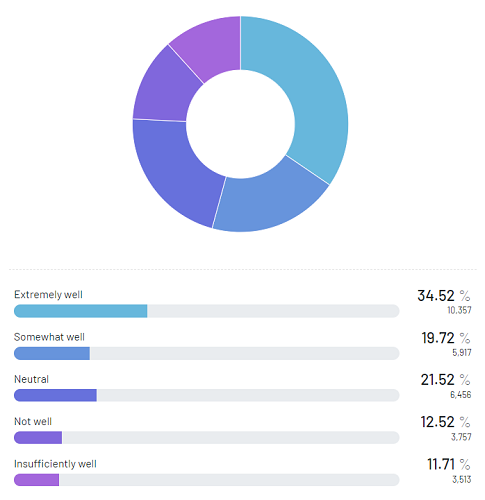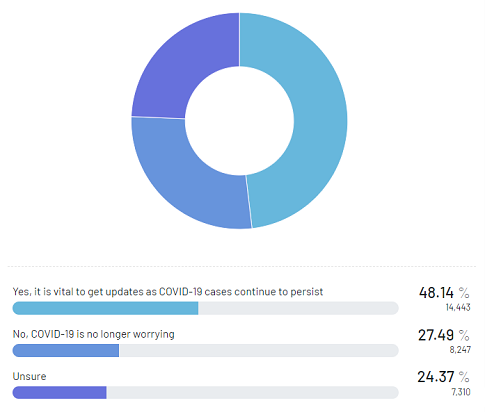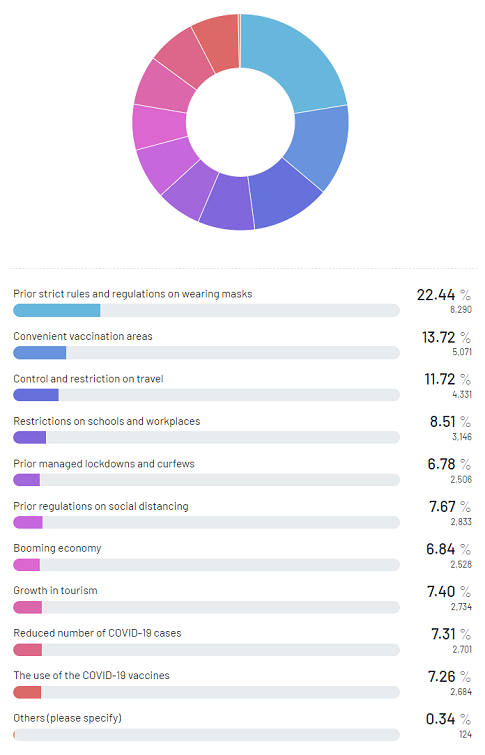 Nearly 35% Felt UAE Tackled COVID-19 Extremely Well
Nearly 35% Felt UAE Tackled COVID-19 Extremely WellFace mask regulations have been mandatory in the UAE for more than two and a half years. The UAE has been a global leader in its immunization efforts, with 100% of the eligible population receiving the vaccine by November 2021. Eventually, authorities in the UAE relaxed most COVID safety regulations as the number of daily infections continued to fall, and deaths from the virus remained almost zero for nearly three months.
The National Emergency Crisis and Disaster Management Authority (NCEMA) of the UAE announced the end of its Covid-19 mask requirements. NCEMA tweeted that masks will still be necessary for hospitals, places of worship, and public transport. For this reason, Real Research launched a survey on UAE dropping Covid-19 mask rule. The survey aims to seek the public perception of society’s return to a life of normalcy after two and a half years. Here are the results.
Highlights:
- 48.98% are well aware that UAE lifted mask restrictions in nearly all public indoor spaces after two and a half years
- 38.94% of responses reveal that students and teachers will now go to school without limitations
- 34.52% say UAE’s steps to curb COVID-19 are highly effective
UAE Dropping Covid-19 Mask Rule
The survey starts with a poll on whether respondents are aware that the UAE lifted mask restrictions in nearly all public indoor spaces after two and a half years. In response, 48.98% said ‘Yes, I am well aware’ and 26.79% said ‘Yes, I heard about it’. Meanwhile 24.23% replied ‘No.’
Further on, the long-held mask rule was a pillar of the UAE’s measures against COVID-19, as well as the vaccinations and rapid PCR tests available. The UAE lifted mask restrictions survey then asks respondents’ opinion on how the UAE “overcome the Covid-19 issue”.
According to the survey, 34.52% thought the UAE handled the issue extremely well, 21.52% were neutral, and 19.72% thought they managed it somewhat well. Meanwhile, 12.52% felt UAE did not handle it well, and 11.71% thought the efforts were insufficient.

Consequently, the survey, in light of the lifted mask restrictions, reveals the most critical place to continue to wear a mask. 29.78% of respondents chose hospitals, schools (15.71%), public transport (15.11%), malls (12.28%), mosques and areas of worship (9.31%), restaurants & cafes (8.7%), and offices & workplaces (8.6%).
Need for Updates Despite Lifting of COVID-19 Restrictions
Then, the survey asks respondents’ opinions about the lifting of COVID-19 restrictions in schools. Majorly 38.94% revealed that students and teachers will be able to go to school without limitations. Contrastingly, 21.19% feel COVID-19 still remains a threat, thus children need to be careful. Meanwhile, 20.25% believe parents can now end remote learning, whereas some respondents (19.18%) still worry about the health of their children.

The UAE will halt its broadcast of COVID-19 case updates. The survey asks if it’s important to publish the daily tally of COVID-19 cases. To which, a majority of 48.14% say ‘Yes, it is vital to get updates as COVID-19 cases continue to persist’. The other 27.49% say ‘No, COVID-19 is no longer worrying’.
The survey on the UAE lifted mask restrictions wants respondents’ opinion on removing travel restrictions for visitors as well. 37.77% suggest, ‘Yes, definitely’, 22.47% feel ‘Yes, somewhat’, whereas 16.16% say ‘No, definitely not.’
UAE’s Steps Taken To Curb the Spread of COVID-19
The survey also reveals that 34.21% feel the UAE’s steps taken to curb the spread of COVID-19 are highly effective, 21.71% remain neutral, and 19.23% say they were somewhat effective. Meanwhile, 13.14% thought they were somewhat ineffective and 11.71% felt they were highly ineffective.

Accordingly, the survey asks about the factors that contributed to the UAE’s lifted mask restrictions. In turn, respondents chose: prior strict rules and regulations on wearing masks (22.44%), convenient vaccination areas (13.72%), control and restrictions on travel (11.72%), and restrictions on schools and workplaces (8.51%).
On the other hand, some responses were as follows: prior regulations on social distancing (7.67%), growth in tourism (7.40%), and a reduced number of COVID-19 cases (7.31%).
Lastly, the survey asked how likely respondents think other countries will follow the lifting of the COVID-19 mask rule. 30.68% replied, ‘highly likely’, 22.22% were ‘neutral’, and 21.53% said ‘likely’. Meanwhile, 13.48% believe it is unlikely to happen, and 12.10% think it is highly unlikely.
Methodology | |
| Survey Title | Survey on UAE Dropping Covid-19 Mask Rule |
| Duration | September 29- October 06, 2022 |
| Number of Participants | 30,000 |
| Demographics | Males and females, aged 21 to 99 |
| Participating Countries | Afghanistan, Algeria, Angola, Argentina, Armenia, Australia, Azerbaijan, Bahrain, Bangladesh, Belarus, Benin, Bolivia,… Brazil, Brunei, Bulgaria, Burkina Faso, Cambodia, Cameroon, Canada, Chile, China, China (Hong Kong) China (Macao), China (Taiwan), Colombia, Costa Rica, Croatia, Czech Republic, Ecuador, Egypt, El Salvador, Ethiopia, Finland, France, Gambia, Georgia, Germany, Ghana, Greece, Greanada, Guatemala, Honduras, Hungary, India, Indonesia, Iraq, Ireland, Israel, Italy, Ivory Coast, Japan, Jordan, Kenya, Kuwait, Kyrgyzstan, Latvia, Lebanon, Libya, Lithuania, Malaysia, Maldives, Maluritania, Mexico, Moldova, Mongolia, Morocco, Mozambique, Myanmar [Burma], Namibia, Nepal, Nicaragua, Nigeria, Oman, Pakistan, Palestine, Panama, Peru, Philippines, Poland, Portugal, Qatar, Romania, Russia, Saudi Arabia, Serbia, Sierra Leone, Singapore, Slovakia, South Africa, South Korea, Spain, Sri Lanka, Tanzania, Thailand, Togo, Tunisia, Turkey, Turkmenistan, Uganda, Ukraine, United Arab Emirates, United Kingdom, United States, Uruguay, Uzbekistan, Venezuela, Vietnam, Yemen, Zimbabwe. |
RR Author
Real Research News is the media platform that presents insights and studies of wide-range of topics. It focuses on insights gathered from its survey app.







